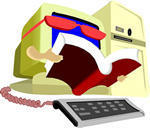
Okay, so your name isn’t J.K. Rowling or Stephen King or Shelby Foote. None of your friends or relatives works for Random House. And finding an agent seems as convoluted a process as counting votes in Florida.
Richard H. Rupp ’56, ’57M.A. knows that story. The recently retired Appalachian State University English professor has published several nonfiction books. But when he finished his first novel, the travails began. “I got nowhere with 14 or 16 different publishers,” he says.
So Rupp anted up some cash and turned to the newest chapter in the publishing industry: print on demand. Now his thriller, Unity, is in print, and interested readers can either read the novel online or order a paperback copy.
Unity was published by 1stBooks Library, based in Bloomington, Indiana, a leading print on demand (POD) and electronic book publisher. “Basically what we provide is an opportunity to be published,” says Patrick East, director of author promotions.
The new technology of print on demand means publishers can print books one at a time, instead of printing a certain number of copies. For example, once an author buys 1st Books’ services and sends in that treasured manuscript, the work is formatted, headers are created and a cover is designed. The type then is stored digitally. The whole process takes about four months. After that, whenever a copy is ordered, the text goes through a printing and binding machine and out pops the book.
1st Books publications are available in four different formats — online as an electronic book, as a paperback, as a hardback or as a Rocket eBook (designed for a portable book reader). The vast majority of 1stBooks sales are paperback POD copies, says East.
“Almost nobody buys the electronic one — unless you’re Stephen King,” says C. Bob Wray ‘52, ’58M.A. His nonfiction book, St. Thomas More at the Millennium, got zero sales as an electronic book but several as a paperback. East, however, believes that situation may change. "We’re at the beginning of the electronic book revolution," he says, with readers becoming more comfortable with the idea or reading online.
The self-publishing route of 1stBooks costs about $600 for the basic electronic and paperback package, but decent sales can earn that money back. Authors earn 30 percent on sales of each paperback or hardback book. For electronic books, they earn 100 percent of the first $300 in sales and 40 percent after that. The author retains all rights to her book, however, so if a mainstream publisher or a Hollywood producer wants to purchase the rights, the author can make the deal.
Throughout the relatively new POD industry, different prices and services can be found Writers who are technically proficient may opt for iuniverse.com, which offers one of its POD services for $99. For that service, authors must submit their manuscript online in a certain format.
Some POD companies do offer promotional services, including preparing press releases and scheduling book signings. Thanks to 1st Books, Rupp has done a reading at a local bookstore and spoken at a Kiwanis meeting. And he’s sold about 200 copies of Unity. Wray did a signing during his winter stay in Naples, Florida, and hopes to do more.
It’s still up to the author to create a market for his book, says Rupp. “If you want to promote it, you have to do it yourself.” Unlike vanity presses of old, however, POD books can be found through online bookstores and the POD company’s website. And yes, a few POD authors have sold their books to mainstream publishers and to Hollywood.
But, cautions Rupp, don’t count on this as a path to riches. “A lot depends on expectations — what do you want?” he notes. Rupp has finished his second novel and hopes to find a conventional publisher this time around.
Wray echoes that take. “You don’t make money on it,” he says. But there are perks: “Your kids are proud of it — and people introduce me as an author.”
Traditional publishing companies are taking notice of POD technology, too. Currently, says East, those companies are focusing on out-of-print books. Eventually, as all texts are digitally stored, a book will never truly be “out of print.”
Links
iuniverse
Carol Schaal is managing editor of this magazine.